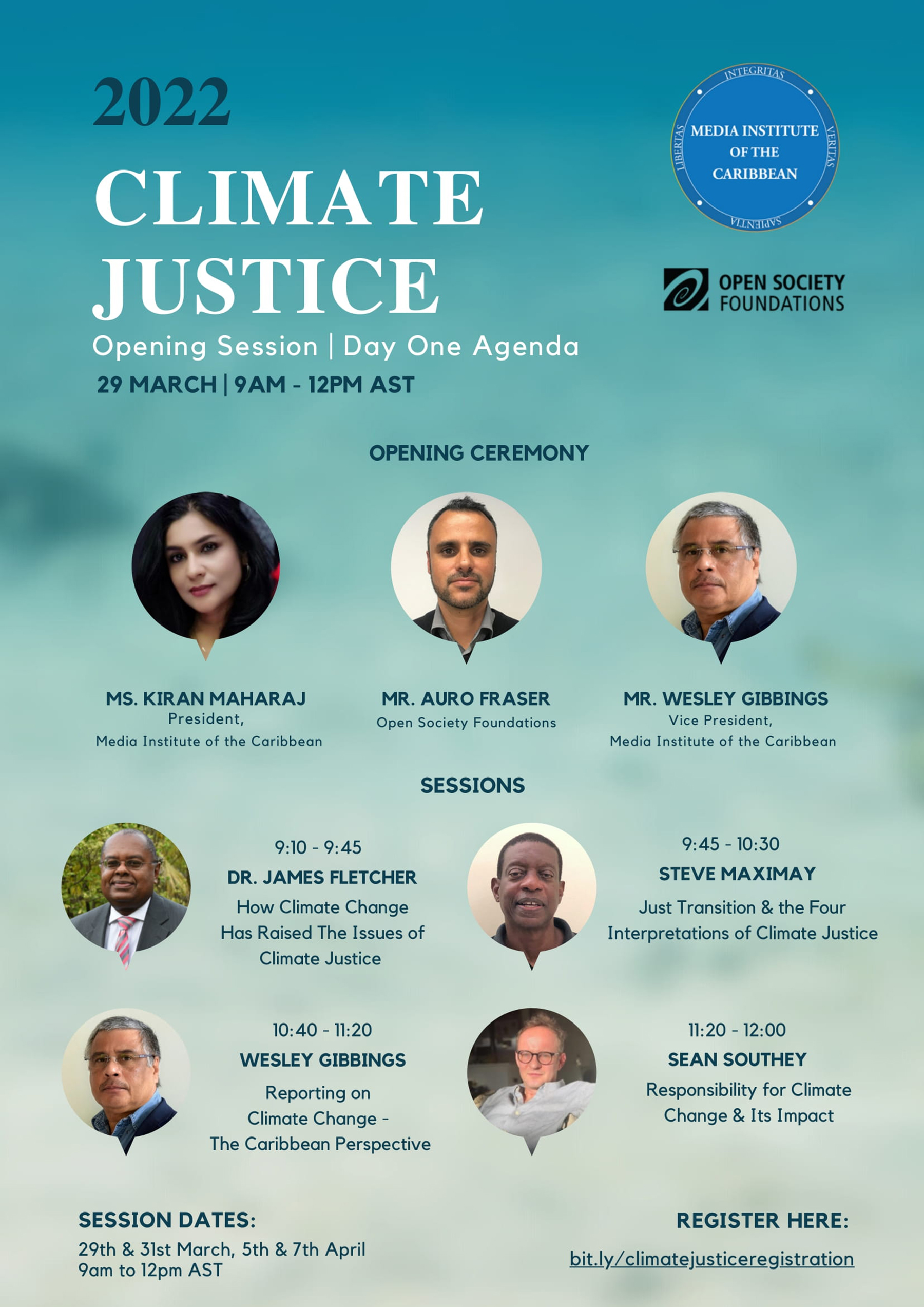By Elesha George
At least 40 journalists across 26 countries participated in the first part of a climate justice media series on Tuesday hosted by the Media Institute of the Caribbean (MIC).
The four-day virtual series focuses on journalists’ responsibility in reporting climate change and their roles as influencers in the public arena.
It is a partnership with grant-making network Open Society Foundations, and explores the intergenerational impacts of climate change, developing the climate justice storyboard and the cost of adaptation, among other topics.
Yesterday, special focus was placed on “solutions journalism” and how reporters can use this approach to encourage people and businesses to reduce their carbon footprints.
“For me, solutions journalism is you help reveal and surface a way a business can work and encourage them and celebrate them to do so, so they shift the way they operate in favour of a climate positive environment,” said Sean Southey, CEO of PCI Media Impact.
Wesley Gibbings, an award-winning Trinidadian journalist, media trainer and press freedom campaigner, advised journalists not to mix matters when reporting on climate change and to be clear in their story development.
“We need to be careful that in arriving at a notion of balance that we are weighing equal or we are aware of the inequity, inequality between the weight of one argument over the other,” he said.
Meanwhile, Steve Maximay, an EU-recognised expert on climate change, addressed “just transition”, which is a framework developed by the trade union movement to encompass a range of social interventions needed to secure workers’ rights and livelihoods when economies are shifting to sustainable production, primarily combating climate change and protecting biodiversity.
He noted a number of what he called “false adaptation drivers, very active policies and practices” which do not effectively address climate problems.
“There are some activities, projects, processes that appear green, but it’s really ‘green washing’ in that it’s business as usual but it’s really just a green cover,” he remarked.
“This climate justice issue requires an all-of-government, all-of-society approach. I don’t think it is fair that the journalists bear the brunt of the responsibility of investigating without that supportive eco system.”
Another guest speaker, the former Minister for Public Service, Sustainable Development, Energy, Science and Technology in Saint Lucia, Dr James Fletcher, spoke on the formation of the Paris Agreement on Climate Change, as a victory for small island developing states (SIDS) while noting how European countries continue to refuse to discuss reparations for climate damages.
“The developed countries do not want to have a conversation at all about liability and compensation.
“Where they absolutely draw the line is saying that they are liable for that damage and they, therefore, because of that liability, must compensate us with some type of financial or other support and that I think is a hurdle we have to get past,” he explained.
Assistance, he noted, should be forthcoming and should be in the form of grants from the country’s most responsible for the unprecedented changes in the environment.
“You’re actually asking us to borrow money to respond to a problem that we did not cause. So, you’re benefitting from it,” he said.
“So, we’ve been very adamant that the funding that’s provided for adaptation and particularly for loss and damage has to be grant funding. I mean in some instances we can consider highly concessional funding, but by and large it has to be grant funding.”
Dr Fletcher said, however, that loan funding can assist with mitigation efforts, as Caribbean countries are among those greatly affected by climate change.
The doctor also made reference to the second working group on the intergovernmental panel on climate change and its latest report on impacts adaptation vulnerability.
The Working Group II’s contribution to the Sixth Assessment Report assesses the impacts of climate change, looking at ecosystems, biodiversity, and human communities at global and regional levels. It also reviews vulnerabilities and the capacities and limits of the natural world and human societies to adapt to climate change.
Dr Fletcher described the group’s findings as “scary”, while noting that the report acknowledged that climate change impacts were driving displacement.
“The desktop simulations are not even able to predict what we’re seeing right now, and the climate and weather extremes are increasingly driving displacement in all regions with small island developing states like ours in the Caribbean disproportionally affected,” he stated.
The series will run until April 7 and students who are interested in climate change studies are also being encouraged to participate.


